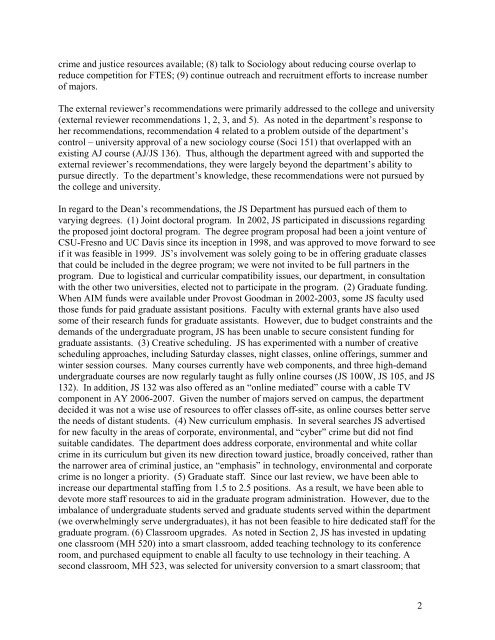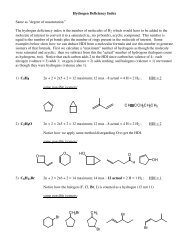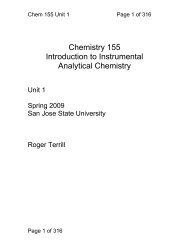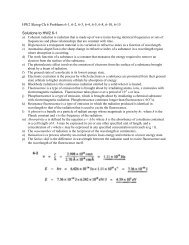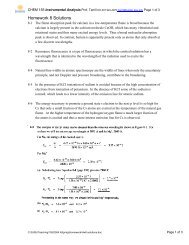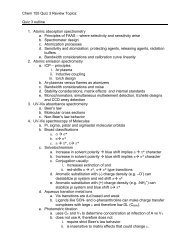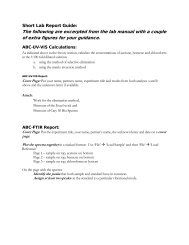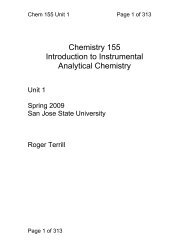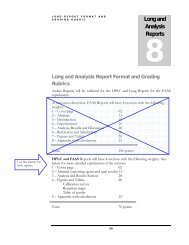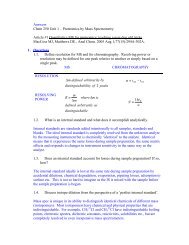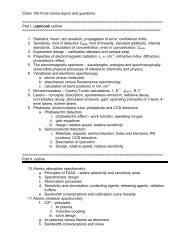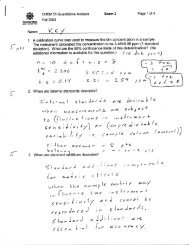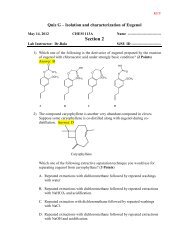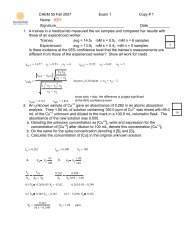Justice Studies - Department of Chemistry - San Jose State University
Justice Studies - Department of Chemistry - San Jose State University
Justice Studies - Department of Chemistry - San Jose State University
You also want an ePaper? Increase the reach of your titles
YUMPU automatically turns print PDFs into web optimized ePapers that Google loves.
crime and justice resources available; (8) talk to Sociology about reducing course overlap toreduce competition for FTES; (9) continue outreach and recruitment efforts to increase number<strong>of</strong> majors.The external reviewer’s recommendations were primarily addressed to the college and university(external reviewer recommendations 1, 2, 3, and 5). As noted in the department’s response toher recommendations, recommendation 4 related to a problem outside <strong>of</strong> the department’scontrol – university approval <strong>of</strong> a new sociology course (Soci 151) that overlapped with anexisting AJ course (AJ/JS 136). Thus, although the department agreed with and supported theexternal reviewer’s recommendations, they were largely beyond the department’s ability topursue directly. To the department’s knowledge, these recommendations were not pursued bythe college and university.In regard to the Dean’s recommendations, the JS <strong>Department</strong> has pursued each <strong>of</strong> them tovarying degrees. (1) Joint doctoral program. In 2002, JS participated in discussions regardingthe proposed joint doctoral program. The degree program proposal had been a joint venture <strong>of</strong>CSU-Fresno and UC Davis since its inception in 1998, and was approved to move forward to seeif it was feasible in 1999. JS’s involvement was solely going to be in <strong>of</strong>fering graduate classesthat could be included in the degree program; we were not invited to be full partners in theprogram. Due to logistical and curricular compatibility issues, our department, in consultationwith the other two universities, elected not to participate in the program. (2) Graduate funding.When AIM funds were available under Provost Goodman in 2002-2003, some JS faculty usedthose funds for paid graduate assistant positions. Faculty with external grants have also usedsome <strong>of</strong> their research funds for graduate assistants. However, due to budget constraints and thedemands <strong>of</strong> the undergraduate program, JS has been unable to secure consistent funding forgraduate assistants. (3) Creative scheduling. JS has experimented with a number <strong>of</strong> creativescheduling approaches, including Saturday classes, night classes, online <strong>of</strong>ferings, summer andwinter session courses. Many courses currently have web components, and three high-demandundergraduate courses are now regularly taught as fully online courses (JS 100W, JS 105, and JS132). In addition, JS 132 was also <strong>of</strong>fered as an “online mediated” course with a cable TVcomponent in AY 2006-2007. Given the number <strong>of</strong> majors served on campus, the departmentdecided it was not a wise use <strong>of</strong> resources to <strong>of</strong>fer classes <strong>of</strong>f-site, as online courses better servethe needs <strong>of</strong> distant students. (4) New curriculum emphasis. In several searches JS advertisedfor new faculty in the areas <strong>of</strong> corporate, environmental, and “cyber” crime but did not findsuitable candidates. The department does address corporate, environmental and white collarcrime in its curriculum but given its new direction toward justice, broadly conceived, rather thanthe narrower area <strong>of</strong> criminal justice, an “emphasis” in technology, environmental and corporatecrime is no longer a priority. (5) Graduate staff. Since our last review, we have been able toincrease our departmental staffing from 1.5 to 2.5 positions. As a result, we have been able todevote more staff resources to aid in the graduate program administration. However, due to theimbalance <strong>of</strong> undergraduate students served and graduate students served within the department(we overwhelmingly serve undergraduates), it has not been feasible to hire dedicated staff for thegraduate program. (6) Classroom upgrades. As noted in Section 2, JS has invested in updatingone classroom (MH 520) into a smart classroom, added teaching technology to its conferenceroom, and purchased equipment to enable all faculty to use technology in their teaching. Asecond classroom, MH 523, was selected for university conversion to a smart classroom; that2


